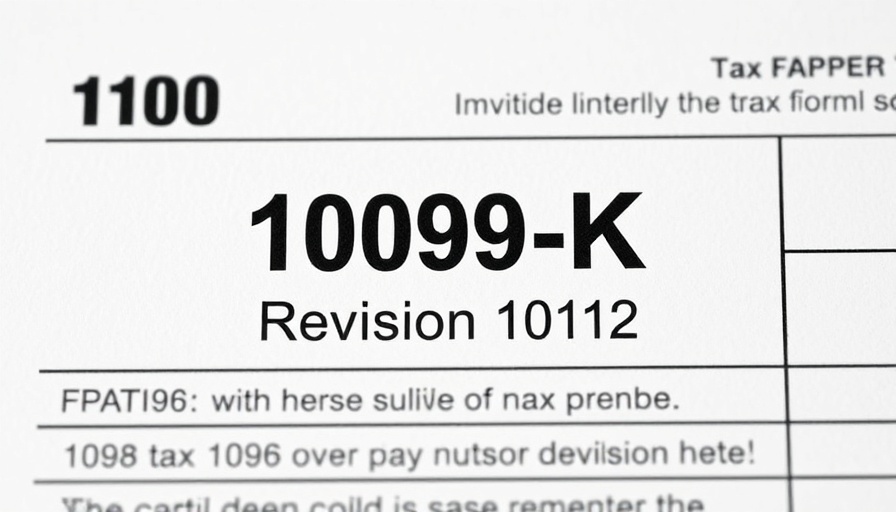
Understanding the Implications of the New 1099-K Form Thresholds
The IRS’s reporting requirements regarding the 1099-K form have been a focal point for freelancers, small business owners, and those utilizing payment platforms like Venmo, Cash App, or Etsy for transactions. The need for clarity has heightened with the recent adjustments in the thresholds for receiving these forms. Originally set to take effect with the 2023 tax year, these changes provide necessary adjustments in the way income is reported, aligning with an increasingly digitized marketplace.
What is the 1099-K Form?
Form 1099-K is a critical document designed for income reporting from payment processors. It captures gross payment transactions made through credit and debit cards and third-party platforms, aiming to ensure that business-related incomes are properly captured for tax purposes. Under previous regulations, which remained in place until now, only transactions exceeding $20,000 with at least 200 transactions qualified for this reporting. However, new regulations dramatically lower these thresholds, significantly impacting a broader range of individuals.
A Closer Look at the New Thresholds
As announced, the new 1099-K thresholds are set to evolve as follows:
- In 2024, any cumulative amount exceeding $5,000 will trigger a 1099-K.
- In 2025, this threshold will decrease further to $2,500.
- By 2026 and thereafter, any amount exceeding $600 will necessitate reporting.
This phased approach reflects the IRS’s gradual transition to a system where a larger volume of transactions will be monitored, aiming to reduce tax evasion in everyday transactions among the growing gig economy.
Implications for Gig Workers and Small Business Owners
These threshold reductions mean that significantly more people—particularly those engaging in side hustles or utilizing payment apps for regular transactions—will find themselves on the receiving end of 1099-Ks. With gig work continuing to expand, the intention behind this shift is clear: enhance tax compliance. Those accustomed to operating under the radar may now need to reconsider their reporting practices and financial record-keeping.
Who Will Be Affected?
The broadened net affects anyone who sells goods or earns income through platforms that will issue 1099-K forms, including:
- Freelancers and contractors receiving payment for services rendered.
- Individuals who may occasionally sell personal items online.
- Regular sellers on platforms such as Etsy or eBay.
It is essential to note, however, that payments for personal gifts or loan repayments are exempt from this reporting, maintaining a certain level of privacy for non-business transactions.
Record-Keeping and Reporting Responsibilities
The burden of accuracy lies not only on payment processors but also on taxpayers who must correctly report their incomes. Proper documentation and record-keeping are paramount for individuals who might not understand that they need to report gross amounts, not just profits from sales.
Practicing detailed bookkeeping will enhance preparedness for tax seasons ahead:
- Keep receipts and records organized, detailing all transactions.
- Ensure payment platforms have accurate TINs (Tax Identification Numbers), as discrepancies can lead to unwanted tax implications.
- Understand the difference between gross proceeds and taxable income.
Future Insights: Navigating the Changing Tax Landscape
As income strategies shift with economic trends, understanding tax obligations becomes more crucial to maintaining financial health. The lower thresholds aim to encourage compliance, but they may also raise questions regarding fairness in taxation, particularly for those engaged in casual selling.
Understanding these changes can prompt a necessary review of tax strategies for individuals venturing into the world of side hustles or e-commerce. Small businesses may find that adequate preparation now, in light of these reporting changes, not only eases the transition but also minimizes financial risks associated with improper reporting.
Conclusion: What Should You Do Next?
The IRS updates for the 1099-K form are sure to create ripples throughout the gig economy and among small business owners. Whether you are a casual seller or a full-time freelancer, now is the time to reevaluate how you handle online income. Cultivating clear and organized financial records will not only make tax time easier but will offer peace of mind that you are accurately reporting and complying with IRS regulations.
 Add Row
Add Row  Add
Add 



 Add Row
Add Row  Add
Add 
Write A Comment